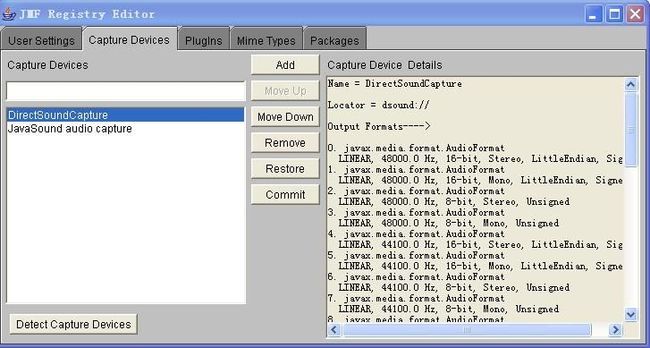JMF捕获音频
1. 捕获媒体数据的步骤:
(1) 查询CaptureDeviceManager,来定位你需要使用的媒体采集设备。
(2) 得到此设备的CaptureDeviceInfo实例。
(3) 从此CaptureDeviceInfo实例获得一个MediaLocator,并通过它来创建一个DataSource。
(4)用此DataSource创建一个Player或Processor。
(5) 启动此Player或Processor开始捕获媒体数据。
2.CaptureDeviceManager、CaptureDeviceInfo、MediaLocator
在JMF中,CaptureDeviceManager也是一个manager类,它提供给了一个列表,这个列表显示当前系统可以被使用的设备名称。同时CaptureDeviceManager可以通过查询的方法对设备进行定位并返回设备的配置信息对象CaptureDeviceInfo,它也可以通过注册的方法向列表加入一个新的设备信息,以便为JMF使用。
设备可通过CaptureDeviceManager的getDevice()方法直接获得设备控制权,设备的控制权一旦得到,就可以以此设备作为一个MediaLocator,可以通过CaptureDeviceInfo的getLocator()方法得到。
3.JMF识别的音频采集设备
4.一个实例实现音频捕获
实例有两个文件组成。CaptureDemo.java实现
①查询、获得音频采集设备。
②捕获音频。
③将音频保存到本地文件foo.wav。
StateHelper实现处理器(processor)的状态控制管理。以下为流程图:
import javax.media.CaptureDeviceInfo;
import javax.media.CaptureDeviceManager;
import javax.media.DataSink;
import javax.media.Manager;
import javax.media.MediaLocator;
import javax.media.NoDataSinkException;
import javax.media.NoProcessorException;
import javax.media.Processor;
import javax.media.control.StreamWriterControl;
import javax.media.format.AudioFormat;
import javax.media.protocol.DataSource;
import javax.media.protocol.FileTypeDescriptor;
public class CaptureDemo
{
/* *
* @param args
*/
public static void main(String[] args)
{
// TODO Auto-generated method stub
CaptureDeviceInfo di = null ;
Processor p = null ;
StateHelper sh = null ;
Vector devList = CaptureDeviceManager.getDeviceList( new AudioFormat( " linear " , 44100 , 16 , 2 ));
if (devList.size() > 0 )
{
di = (CaptureDeviceInfo)devList.firstElement();
System. out .println(di.getName());
System. out .println(di.toString());
}
else
System.exit( - 1 );
try
{
p = Manager.createProcessor(di.getLocator());
sh = new StateHelper(p);
}
catch (java.io.IOException ex)
{
System.exit( - 1 );
}
catch (NoProcessorException e)
{
// TODO Auto-generated catch block
System.exit( - 1 );
}
if ( ! sh.configure( 10000 ))
{
System.exit( - 1 );
}
p.setContentDescriptor( new FileTypeDescriptor(FileTypeDescriptor.WAVE));
if ( ! sh.realize( 10000 ))
{
System.exit( - 1 );
}
DataSource source = p.getDataOutput();
MediaLocator dest = new MediaLocator( " file:///c:/foo.wav " );
DataSink fileWriter = null ;
try
{
fileWriter = Manager.createDataSink(source, dest);
fileWriter.open();
}
catch (NoDataSinkException e)
{
// TODO Auto-generated catch block
System.exit( - 1 );
}
catch (java.io.IOException ex)
{
System.exit( - 1 );
}
catch (SecurityException ex)
{
System.exit( - 1 );
}
StreamWriterControl swc = (StreamWriterControl) p.getControl( " javax.media.control.StreamWriterControl " );
if (swc != null )
{
swc.setStreamSizeLimit( 500000000 );
}
try
{
fileWriter.start();
}
catch (java.io.IOException ex)
{
System.exit( - 1 );
}
sh.playToEndOfMedia( 5000 * 1000 );
sh.close();
fileWriter.close();
}
}
import javax.media.ControllerClosedEvent;
import javax.media.ControllerErrorEvent;
import javax.media.ControllerEvent;
import javax.media.ControllerListener;
import javax.media.EndOfMediaEvent;
import javax.media.Player;
import javax.media.Processor;
import javax.media.RealizeCompleteEvent;
public class StateHelper implements ControllerListener
{
Player player = null ;
boolean configured = false ;
boolean realized = false ;
boolean prefetched = false ;
boolean endOfMedia = false ;
boolean failed = false ;
boolean closed = false ;
public StateHelper(Player p)
{
this .player = p;
p.addControllerListener( this );
}
public boolean configure( int timeOutMillis)
{
long startTime = System.currentTimeMillis();
synchronized( this )
{
if ( this .player instanceof Processor)
{
((Processor)player).configure();
}
else
return false ;
while ( ! this .configured &&! this .failed)
{
try
{
this .wait(timeOutMillis);
}
catch (InterruptedException ex)
{
}
if (System.currentTimeMillis() - startTime > timeOutMillis)
break ;
}
}
return this .configured;
}
public boolean realize( int timeOutMillis)
{
long startTime = System.currentTimeMillis();
synchronized( this )
{
this .player.realize();
while ( ! this .realized &&! this .failed)
{
try
{
this .wait(timeOutMillis);
}
catch (InterruptedException ex)
{
}
if (System.currentTimeMillis() - startTime > timeOutMillis)
break ;
}
}
return this .realized;
}
public boolean prefetch( int timeOutMillis)
{
long startTime = System.currentTimeMillis();
synchronized( this )
{
this .player.prefetch();
while ( ! this .prefetched &&! this .failed)
{
try
{
this .wait(timeOutMillis);
}
catch (InterruptedException ex)
{
}
if (System.currentTimeMillis() - startTime > timeOutMillis)
break ;
}
}
return this .prefetched &&! this .failed;
}
public boolean playToEndOfMedia( int timeOutMillis)
{
long startTime = System.currentTimeMillis();
this .endOfMedia = false ;
synchronized( this )
{
this .player.start();
while ( ! this .endOfMedia &&! this .failed)
{
try
{
this .wait(timeOutMillis);
}
catch (InterruptedException ex)
{
}
if (System.currentTimeMillis() - startTime > timeOutMillis)
break ;
}
}
return this .endOfMedia &&! this .failed;
}
public void close()
{
synchronized( this )
{
this .player.close();
while ( ! this .closed)
{
try
{
this .wait( 100 );
}
catch (InterruptedException ex)
{
}
}
}
this .player.removeControllerListener( this );
}
public synchronized void controllerUpdate(ControllerEvent ce)
{
// TODO Auto-generated method stub
if (ce instanceof RealizeCompleteEvent)
{
this .realized = true ;
}
else if (ce instanceof ConfigureCompleteEvent)
{
this .configured = true ;
}
else if (ce instanceof EndOfMediaEvent)
{
this .endOfMedia = true ;
}
else if (ce instanceof ControllerErrorEvent)
{
this .failed = true ;
}
else if (ce instanceof ControllerClosedEvent)
{
this .closed = true ;
}
else
{
return ;
}
this .notifyAll();
}
}
